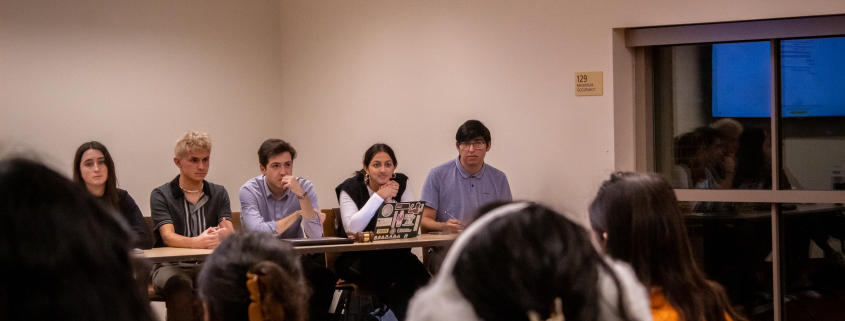USG reconvenes to set semester goals, funding

At the first Undergraduate Student Government senate meeting of the semester Tuesday, USG discussed changes to the Fryft program, explaining that the University reverted to the ride-share model proposed pre-coronavirus was made because the single ride feature was unsustainable. In its first year, the University spent $6 million on the program, but after switching to a single-ride program last year its cost rose to $40 million. The University decided to either change back to the shared ride model or charge students a flat transportation fee, as USC is the only school in the Pac-12 who does not charge such a fee.
Vice President Nivea Krishnan said limiting the shared ride feature to only USC students is “definitely something to look into” because many students expressed concerns about safety.
“When I used the shared ride feature we picked up a grown man and I just thought he may be a PhD student,” said senator Divya Jakatdar.
USG encourages students who wish to express their concerns to submit feedback on its website, and plans to voice these student opinions to the University.
For the spring semester, USG hopes to establish Labor Appreciation Day, student commitment initiatives, permanent transition guides and a crisis communication working group.
Chief programming officer Jillian Fallon presented goals for this semester, including redefining what it means to be in the programming branch and how it fits into USG, continuing to build relationships across USG and prioritizing wellbeing by providing resources to overcome challenges.
As far as long-term objectives, Fallon hopes to work with student groups and help support their events, improve student outreach and participation in event planning, use advocacy liaisons to amplify student needs, finish the end of the term strong and support next year’s administration.
Fallon also nominated Annmarie Easy, a sophomore majoring in political science and international relations and affairs, as the BSA assistant director and Bita Aghaee, a junior majoring in theater, as the Performing Arts Committee assistant director.
The senate unanimously approved the nominations.
Additionally, Chair of External Affairs Monica Rodriguez requested $3,500 for the Black Student Assembly restaurant crawl Feb. 10 and $3,500 for the Asian Pacific American Student Assembly restaurant crawl Feb. 24.
Each restaurant crawl will feature two routes that will take students by shuttle to three restaurants. with fifty seats reserved for each route. Route 1 for the BSA restaurant crawl will feature Earle’s on Crenshaw, Little Belize and Southern Girl Desserts and route 2 will include Fixins Soul Kitchen, Who’s Hungry Caribbean and Southern Girl Desserts. Route 1 for APASA’s restaurant crawl will comprise of Thai by Trio, Woon Kitchen and Phoenix Bakery and route 2 will encompass Broken Mouth, Dollar Hits and Laroolou.
“A lot of students are stuck in this red brick bubble where they don’t really seem to venture beyond campus,” Rodriguez said. “This will encourage [students] to be a part of a community and support business and explore the city.”
The senate unanimously approved the funding proposal.
President Hannah Woodworth highlighted USG’s fall accomplishments including the USC-Los Angeles Airport SCÜP shuttle, which gave 859 rides during fall break, 1211 rides during Thanksgiving break and 1877 rides during winter break; 3947 rides in total. USG hopes to grow that number to 9,000 students by the end of the year.
“[Having the shuttle return to campus] is the goal,” Woodworth said. “It was a combination of budget constraints and logistical challenges such as making a spot at LAX that everyone can meet at and that the shuttle can stay at for pickup. It’s much simpler here because you can just be picked up on campus.”
Other accomplishments include the incorporation of two new assemblies — the Middle Eastern North African Student Assembly and the Joint Assembly of Military-Associated Students — and completing 20 qualitative interviews to collect feedback in regard to funding, project feasibility and resource support in preparation for the transition to the new administration.

